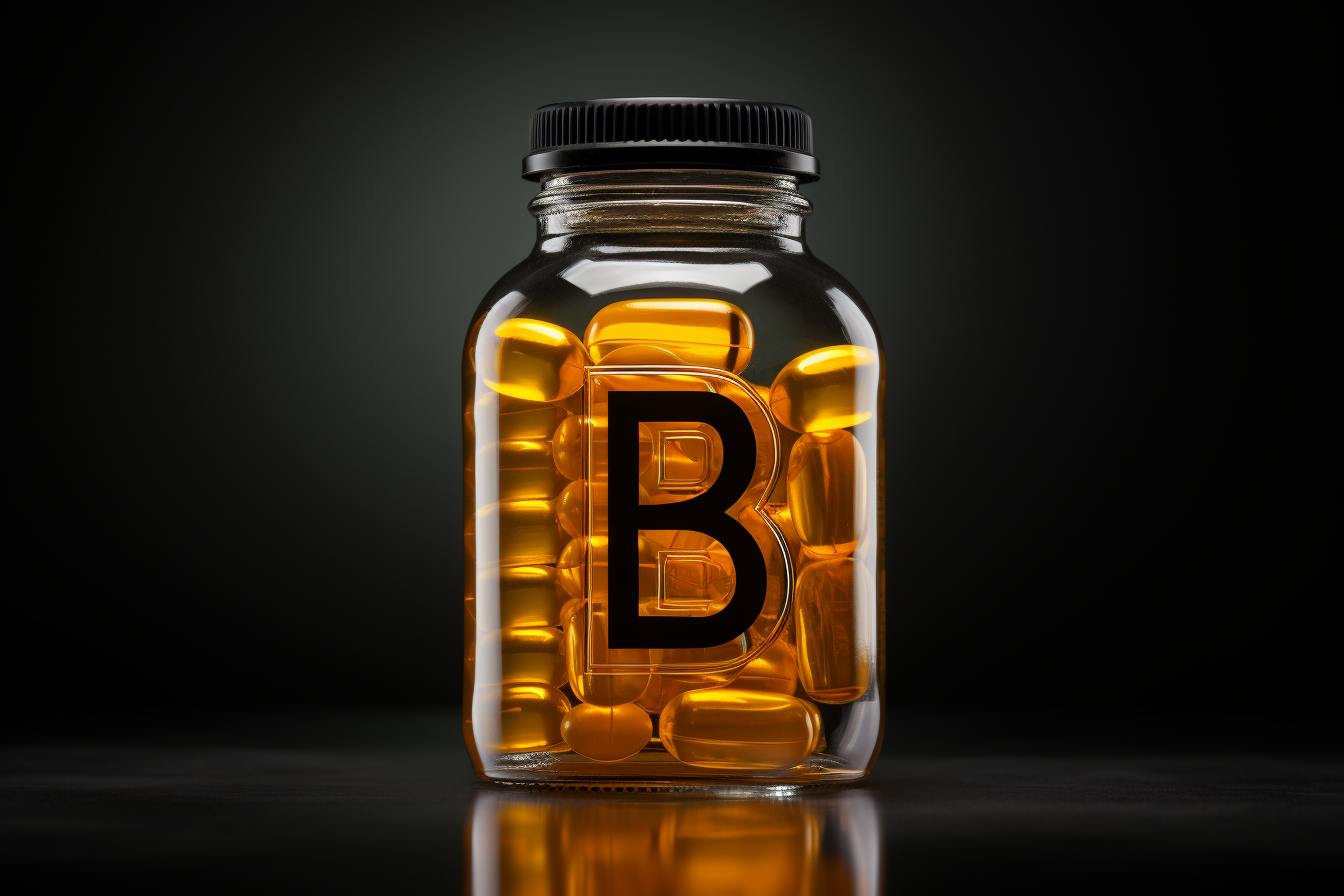Introduction to Vitamin B Supplements
Whoa! Let’s take a second to chat about these underdog heroes we like to call Vitamin B supplements. These little gems are nothing short of amazing, providing a myriad of benefits for our bod, keeping us in tip-top condition. Now, everyone and their grandma knows about the big guns like Vitamin C or D, but the B-Vitamins often get left in the dust. Hold on, though! With a bit of insight, you’ll soon see that they deserve to be front and center!
Here’s the deal. At the heart of the matter is Vitamin B12, an essential pal in our handy health toolkit. It’s all sorts of important, playing a critical role in brain function and red blood cell production, as well as assisting in the synthesis of DNA – talk about a triple threat! Not to mention, its sidekicks include the likes of Vitamin B6 and B1, each packing their unique punch. Now, these aren’t just a flash in the pan, they’re vital to our wellbeing. And while our bodies can’t make ’em, they’re easy-peasy to get from a varied diet or, you guessed it, supplements. In fact:
– Vitamin B6 aids in the creation of neurotransmitters
– B12 keeps our nerve and blood cells healthy and chipper
– Vitamin B1, also known as Thiamine, helps our body turn food into energy
Yup, you can’t mistake it, these B-Vitamins are small but mighty, ready to help us battle every twist and turn that comes our way. So, pop the kettle on, get cozy, and let’s dive deeper into the wonderful world of Vitamin B supplements!
Understanding Vitamin B Complex and B-Complex Vitamins
Whoa, it seems like you’re in a real pickle, trying to get your head around this whole B-Complex vitamins thing, huh? Well, buckle up! Hyped as the superheroes of the vitamin world, B vitamins are a group of eight, yes, eight water-soluble vitamins, which have distinct, yet interrelated functions. Introduced to your body primarily through your diet, these vitamins show up in many foods, from lean meats to fortified foods. You’ve got the Bs – B1 (Thiamine), B2 (mainly, our buddy, Riboflavin), B3 (also known as Niacin), B5 (Pantothenic acid), B6, B7 (Biotin, that is), B9 (Folic acid or folate), and last but not least, B12. They’re like a jigsaw puzzle, each playing their part in maintaining good health. But boy, oh boy, low levels of vitamin B can lead to a variety of health conditions, from heart issues to nervous system problems.

Why, you might ask yourself, is the B-Complex so important? Well, these types of B vitamins play a significant role in several key bodily functions, like helping to form red blood cells and supporting the nervous system. The National Institutes of Health even advises older adults to take in higher amounts of B vitamins to keep the body humming like a well-oiled machine. Talk about the benefits of B! The best part?
You can typically get enough B vitamins by eating a balanced diet, but if you’re deficient in B vitamins, then a vitamin supplement may be just what the doctor ordered, so to speak.
Symptoms of a vitamin B12 deficiency include tiredness, weight loss, and even nerve damage, and can be rectified by increasing vitamin B12 intake through food, taking vitamin B12 injections, or in some cases, using high doses of vitamin B12 supplements. Pretty nifty, huh?
– B1 (Thiamine)
– B2 (The ever-helpful riboflavin)
– B3 (Niacin at your service)
– B5 (Pantothenic acid, the workhorse)
– B6 (keeps your nerve cells happy)
– B7 (Biotin, the beauty vitamin)
– B9 (Folic acid, it’s more than just for pregnant women)
– B12 (Keeps your blood cells healthy)
Remember folks, B vitamins are not just for older adults. Even adults younger than 60 should ensure they receive enough vitamins, including B-complex, in their diet. Here’s a piece of advice coming from a friend: remember that taking care of your body is not just about popping a daily vitamin – it includes regular exercise and good nutrition. B vitamin deficiencies aren’t a walk in the park, but armed with this knowledge, you’re well on your way to health and wellness. Isn’t that a pill worth swallowing?
The Role of Vitamin B12 in the B-Complex Supplement
Well, let’s break it down, shall we? Vitamin B12, a crucial member of the B-Complex family, has a star role indeed! ‘Coz you see, this vitamin acts like a backstage manager making sure all the actors, in this case the bodily functions, do their part in harmony. To be more precise, B12 together with B9, commonly known as folic acid, works hand in hand to prevent birth defects, promote heart health and boost energy. What’s so unique about these two, B12 and folate, is that they also help prevent certain types of anemia. Notably, some good sources of vitamin B12 and folate are present in many foods like animal products, leafy greens, and foods that are fortified with these vitamins. Mind you, some folks might have trouble absorbing B12 from food and in these cases, doctors usually recommend them to take supplements in the form of vitamin B.
Now, moving on to the B-Complex supplement itself, it’s prudent to give some facts about its components. We’re discussing eight B vitamins here – vitamin B1, B2, also known as riboflavin (don’t forget this buddy, a deficiency may cause major symptoms), vitamin B3 or niacin, vitamin B5, B6 and B12, folate (or vitamin B9 for the number enthusiasts), and biotin. Naturally, these vitamins are found in many different foods, but alas, you may not be getting enough vitamin B12 or any of these bad boys due to a variety of reasons. And voila! This is where B-Complex vitamins ride to the rescue, offering all the health benefits of B vitamins in one single supplement where the amounts of these vitamins are well balanced. Regular intake of these vitamins can help rectify any deficiency symptoms. Moreover, these B vitamin supplements are likely to benefit those with low vitamin B12 intakes. Heck, studies have even found that several B vitamins may also support heart health.
Remember though, there’s no one-size-fits-all. Similarly, while taking B-Complex supplements, the right amounts of Vitamin B intake vary person to person, some requiring higher doses than others. So, it’s always a bright idea to consult with a healthcare provider before jumping on the supplement bandwagon.
Identifying Vitamin B Deficiency: Signs and Symptoms
Well, well, aren’t we painting a colorful picture today with the broad strokes of health, talking about identifying Vitamin B deficiency, its signs, and symptoms? Before we dive headfirst into these murky waters, let’s get our feet wet with some basic facts. Vitamins are essential to our health, playing significant roles in our bodies, and honey, Vitamin B isn’t just some runner-up in this race; it’s kingpin material. They found that Vitamin B, in its varied forms such as vitamin B2 or B3, is found in many foods and helps improve energy and overall brain function. Taking B vitamins, like folate and other B complex vitamins, could be as easy as devouring a bowl of cereal fortified with Vitamin B12 that can get the ball rolling. However, if the thought of semi-soggy cereal makes you groove between your eyebrows, folic acid supplements are often recommended as an alternative to ensure you get enough folic acid each day. Riboflavin deficiency, for example, can lead to cracking of the skin, and a more severe sign like vitamin B-12 deficiency could possibly cause neurological issues. Now isn’t that a cat’s whiskers? As the idiom goes, ‘it’s no use crying over spilt milk.’ So if you reckon any of these symptoms of Vitamin B12 deficiency are casting a shadow over your health doorknob, it’s high time to counteract!
People who struggle to absorb Vitamin B12 often have vitamin intake issues and are likely to have low vitamin levels. This could just be about as fun as a root canal procedure! On a serious note, folks, absorbing vitamins, like Vitamin B12 or any other form of the vitamin, is as crucial as the vitamins themselves. You see, it’s not only about what’s on your plate, even though B12 is also found in many animal-based foods, it’s equally about what your body can fully utilize and absorb.
Feeling like your gears are grinding, with unusual tiredness or lightheadedness taking a toll on your day-to-day life? Well, dang it, it might be a deficiency in B12 rearing its ugly head. Luckily, in the natural form of Vitamin or even in supplements, the Vitamin B-3 can be the superhero swooping in to rescue you from the vile clutches of deficiency. Well, who knew vitamins could have such melodrama, eh? But folks, whatever be the case, always consider seeking professional advice before pulling the trigger on the vitamin intake or supplement adjustments. Now, isn’t that a horse of a different color?
The Side Effects and Risks of Taking Too Much Vitamin B
Well, hold your horses, before you go popping vitamin B supplements like candy! While it’s undeniable that vitamins help improve our overall health, let’s not throw all caution to the wind. You see, an excess of a good thing, even something as seemingly harmless as folate and vitamin B, can lead to adverse side effects or even health risks. Believe it or not, there’s such a thing as overdosing on vitamins!

Ouch! Excessive intake of vitamin B can lead to a range of side effects. One minute you’re chomping down supplements chasing good health, and the next thing you know, you’re battling an onslaught of unsettling symptoms.
These may include:
– Stomach cramps and nausea
– Increased urination
– Skin rashes, and
– High blood sugar levels
Moreover, the risks can go up a notch if you’re overdoing vitamin B12 or vitamin B6. Yikes! These could potentially cause nerve toxicity and have a knock-on effect on your neurological health. So, the key here is balance and moderation. It doesn’t behove one to indulge in an overkill by pumping your body full of more vitamins than it realistically needs. So, folks, remember moderation is the key!
The Importance of B Vitamins to Overall Health: Benefits, Foods that Contain B Vitamins and the Best Vitamin B Complex Supplements
Don’t you know? B vitamins are like the unsung heroes of our health scene, often brushed under the carpet while their flashy counterparts nab the limelight. Knocking on health’s door, B vitamins offer a plethora of benefits – it ain’t no exaggeration! From boosts in energy levels to helping maintain a healthy nervous system, right down to that dire need of keeping our bodies ticking over smoothly – like a well-oiled machine. Oh, and did I mention they also play a pivotal role in converting our food into fuel? Absolutely vital, mate!
But, hold your horses; where on earth can you find these little helping hands? Nature’s no fool; in fact, she’s stuffed plenty of foods chock-full of these savvy substances, including
– Whole grains (Hello, vitamin B1)
– Salmon (Rich in vitamin B12)
– Leafy greens (Brimming with folate and vitamin B9)
And if you can’t get enough from your diet, worry not. It’s also brilliantly possible to top up with supplements. Just like choosing between the golden oldies and the latest hits, it’s sometimes hard to pick the right supplement. My two cents? The best Vitamin B complex supplements are those with a clean bill of health; no hidden ingredients, no suspicious additives. It’s like finding a needle in a haystack with so many options, but hey, vitamins help us in more ways than one. Whether it’s vitamin B12 or vitamin B6, these supplements can do wonders for your overall health, making every day bright as a new penny!

Conclusion
In conclusion, it is essential to maintain a well-balanced diet to support one’s health and wellbeing. Vitamins play a crucial role in this regard by providing the necessary nourishments that our bodies need to function optimally. Vitamins help in various physiological processes, including digestion, immunity, and metabolism. More specifically, both folate and vitamin B12 are essential nutrients that are involved in numerous body functions. Folate, also known as Vitamin B9, aids in cell growth and the formation of DNA, which directly contributes to overall health. Meanwhile, Vitamin B12 supports the development of red blood cells, enhances brain function, and even contributes to DNA synthesis. Demonstrating the need for either Vitamin B12 or Vitamin D in our everyday dietary consumption. These vitamins are offered in a plethora of food sources, so it’s beneficial to consume a diverse diet to maximize your vitamin intake. But, it is equally important to remember that these vitamins’ effects can vary for different individuals based on their specific health conditions, dietary habits, and age. Thus, it is always recommended to consult a healthcare provider to ensure the proper intake of these vitamins and embrace a lifestyle that promotes optimal health and wellbeing.
FAQ’s:
Q1. How do vitamins help overall health?
A1. Vitamins are essential for overall health as they help the body to function properly. Vitamins help to maintain healthy cells, tissues, and organs, and can also help to prevent disease.
Q2. What is the importance of folate and vitamin B?
A2. Folate and vitamin B are important for overall health as they help to produce red blood cells, maintain healthy nerve cells, and metabolize proteins and fats. Folate and vitamin B are also important for proper brain development and function.
Q3. What are the benefits of taking vitamin B supplements?
A3. Taking vitamin B supplements can help to increase energy levels, improve mood, and support the immune system. Vitamin B supplements can also help to reduce the risk of certain diseases, such as heart disease and stroke.
Q4. What are the side effects of taking too much vitamin B?
A4. Taking too much vitamin B can lead to side effects such as nausea, vomiting, and diarrhea. It can also cause headaches, dizziness, and fatigue. It is important to speak to a doctor before taking any vitamin B supplements.
Q5. What is the recommended daily intake of vitamin B?
A5. The recommended daily intake of vitamin B varies depending on age and gender. Generally, adults should aim to consume 1.3 milligrams of vitamin B6, 2.4 micrograms of vitamin B12, and 400 micrograms of folate per day.
Q6. What foods are high in vitamin B?
A6. Foods that are high in vitamin B include meat, fish, eggs, dairy products, legumes, nuts, and fortified cereals. Leafy green vegetables, such as spinach and kale, are also good sources of vitamin B.
Q7. What is the difference between vitamin B12 and vitamin B6?
A7. Vitamin B12 is a water-soluble vitamin that helps to produce red blood cells and maintain healthy nerve cells. Vitamin B6 is a water-soluble vitamin that helps to metabolize proteins and fats, and is important for proper brain development and function.



 Huperzine A For Supporting Brain Health
Huperzine A For Supporting Brain Health
